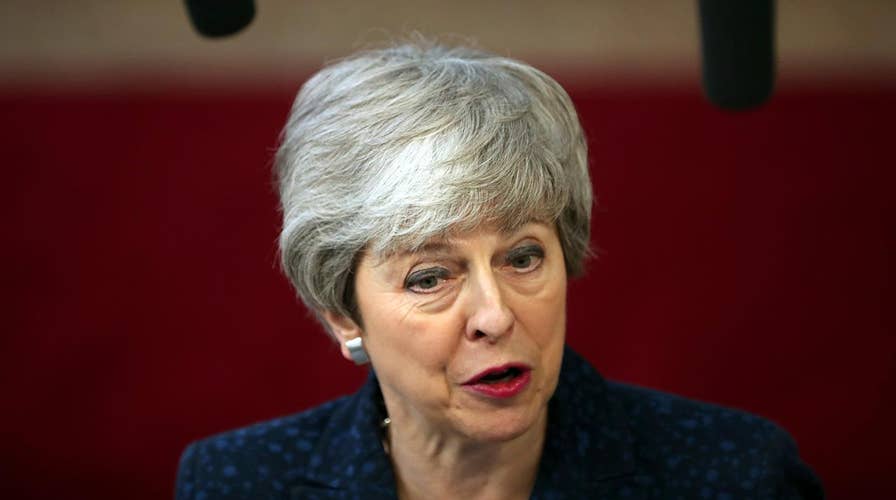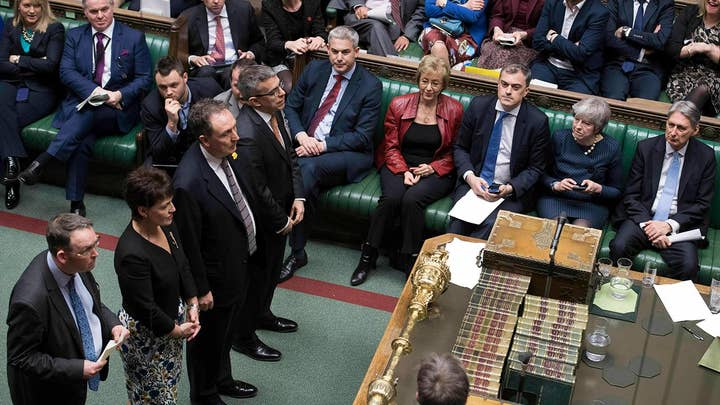European Union leaders on Thursday night agreed to a short-term Brexit extension in order to allow British Prime Minister Theresa May more time to get her withdrawal agreement through Parliament -- just a week before Britain was scheduled to leave the bloc.
Britain was due to leave the E.U. on March 29 without a deal after the withdrawal agreement May negotiated with E.U. leaders in 2018 was shot down for the second time by lawmakers last week -- hurling Britain into a full-blown political crisis and leaving May scrambling for a solution to implement the result of the 2016 referendum.
TRUMP BACKS BREXIT BY PROMISING A 'LARGE SCALE TRADE DEAL' WITH UK
May’s government, as well as business leaders and pro-Remain politicians, have warned that leaving without a deal would cause chaos at ports, and lead to food and medicine shortages across the country. More pro-Brexit MPs have insisted that those alleged perils are overblown.
May is expected to put her deal again to Parliament next week, hoping that concessions that she has made to her Northern Irish coalition partner the Democratic Unionist Party (DUP) will persuade them to back her deal and in turn convince the hardline Brexiteers in her own party to back her deal as a result.
To get more time to get lawmakers on her side, and to allow for the technical details of the deal through Parliament, she traveled to Brussels with a request of a delay until June 30.
The European Council, which consists of the leaders of the E.U.’s member states, had appeared skeptical of giving any delay without a firm plan, but on Thursday night announced they had agreed to a pause until May 22 -- although that is conditional on British lawmakers approving the deal next week.
UK LAWMAKERS REJECT 'NO DEAL' BREXIT, TAKE STEP CLOSER TO DELAYING DEPARTURE
If May is unsuccessful in getting her deal through Parliament, then that delay will only be until April 12, where lawmakers will then face the choice of either leaving without a deal, approving some sort of new or alternative deal, or revoking Article 50 -- the mechanism that triggers Britain’s departure from the bloc.
"What this means in practice is that until that date all options will remain open and the cliff-edge date will be delayed," European Council President Donald Tusk said in a press conference.
May used her remarks at a second press conference to focus on rallying MPs back home to her deal, urging them to pass the legislation.
“I know MPs on all sides of the debate have passionate views and I respect those different positions,” she said. “I hope we can all agree we are now at the moment of decision and I will make every effort to ensure we are able to leave with a deal and move our country forward.”
May has ruled out revoking Article 50, and has said that doing so -- in order to go back to the public with a second referendum -- would risk undermining the British public’s trust in democracy.
"I don’t believe that’s what you want and it is not what I want," May said in a televised speech from 10 Downing Street Wednesday night. "We asked you the question already and you gave us your answer. Now, you want us to get on with it."
If there had been a longer delay, it would have required Britain taking part in the European Parliament elections in May, something that it appears neither the British government nor E.U. leaders want to happen. May has also faced pressure to either resign or hold a general election as a way to break the deadlock in Parliament.
CLICK HERE FOR THE FOX NEWS APP
It is far from clear that May’s deal will muster enough votes to pass, having been rejected 391-242 just this month. That vote came just two months after it was shot down 432-202 in January -- the largest defeat for a prime minister in the history of the House of Commons.
While many on the left in Parliament oppose leaving the E.U. altogether and want a second referendum instead, much of the opposition to the deal from the right and the DUP comes from concern over the “backstop” -- a safety net by which the U.K. temporarily remains in a customs union until a trade deal in secured, so as to avoid a hard border between Ireland and Northern Ireland.
Critics have pointed to the lack of a unilateral exit mechanism in the backstop as evidence that it could lead to Britain never leaving the bloc, or being forced to accept unfavorable trading terms.
May announced earlier this month that she had secured "legally binding" changes to the agreement to prevent a permanent backstop, but it was not enough to get the deal through. The government is hoping that the new assurances to the DUP bring its lawmakers on board and that the risk of no Brexit at all begins to move more pro-Brexit MPs to reluctantly back the deal.
Even if the government whips up enough votes, the deal may not even be put before Parliament. Speaker John Bercow warned on Monday that he would not allow legislation that was “substantially the same” as that that had been rejected by Parliament twice already.










































